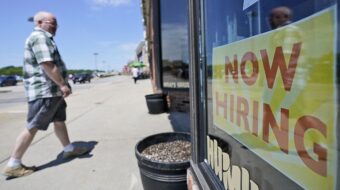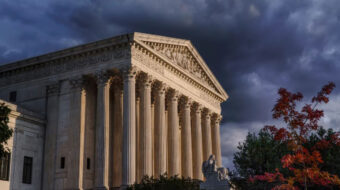Commentary
Gerardo Hernández, one of the imprisoned anti-terrorist Cuban Five, sends a cartoon that he drew depicting a wall around the United States. Not everybody can get in. A sign says, “Anti-Cuba terrorists only.”
Anti-Cuba terrorist Luis Posada Carriles will probably find a home in Miami soon. Six months ago, immigration Judge William L. Abbott ordered Posada’s deportation. He subsequently gave the U.S. government 90 days to find any country (with the exception of Cuba and Venezuela, which seeks Posada’s extradition) to take him in. The time is up on Jan. 24.
According to Jose Pertierra, Venezuela’s U.S.-based attorney, the law says that if Posada has no place to go, he gains parole. Pertierra commented, “If Posada Carriles hits the streets, mendacity will have triumphed as it did when the world was told that Iraq had weapons of mass destruction.”
Demonstrations protesting against U.S. sanctuary for Posada are scheduled to take place in Miami soon, according to Cuba solidarity activist Andres Gomez.
Posada and Orlando Bosch, a parolee living in Miami for 17 years, are admitted terrorists. They stand accused of bombing a Cuban airliner in 1976, killing 73 people. For the Bush administration, however, Posada is merely an undocumented immigrant, not a murderer. Conveniently, the immigration court handling his case lacks authority to grant extradition requests.
Backed up by three treaties with the U.S., Venezuela has twice requested Posada’s extradition. After months of stonewalling by Washington, on Jan. 18 Venezuelan Ambassador Bernardo Alvarez called upon “the American people to demand that the U.S. government abide by its international obligations.”
The U.S. government’s coddling of anti-Cuba terrorists is nothing new. Now that Hugo Chávez is president of Venezuela, however, it would appear that anti-Venezuela terrorists are welcome in the U.S., too. Perhaps the wording on Gerardo Hernández’s sign needs some modification.
On Dec. 2, a Venezuelan judge in Caracas convicted three men for the 2004 murder of state prosecutor Danilo Anderson, who had been leading the investigation of the attempted coup against Chávez in 2002. Court documents implicated five others in Anderson’s murder. Of these, two were killed in a gunfight with Venezuelan police. But two others — Johan Pena and Pedro Lander, former Miami police officers — fled home to Florida.
Witnesses placed Pena near the crime scene, and Lander allegedly made the bomb used in the attack. The U.S. has refused to turn them over the Venezuelan authorities.
Pena, incidentally, aired his anti-Chávez views over Miami’s Channel 41 five months ago.
There is yet another Miami angle. The chief witness in the Anderson case, Giovanni José Vásquez, claims that former Miami FBI head Héctor Pesquera attended a September 2003 meeting in Panama at which the killing of the Venezuelan official was planned. Also on hand were a “CIA agent with the surname Morrison,” he said, and Luis García of Miami’s Comandos F-4, an anti-Cuba paramilitary group.
This is the same Pesquera who, in 1998, led the pretrial FBI investigation of Gerardo Hernández and his four compañeros, now known as the Cuban Five.
It all adds up to a tangled web of right-wing, anticommunist intrigue. When will these schemers be brought to trial?

MOST POPULAR TODAY


Zionist organizations leading campaign to stop ceasefire resolutions in D.C. area

High Court essentially bans demonstrations, freedom of assembly in Deep South

Afghanistan’s socialist years: The promising future killed off by U.S. imperialism

Communist Karol Cariola elected president of Chile’s legislature





Comments